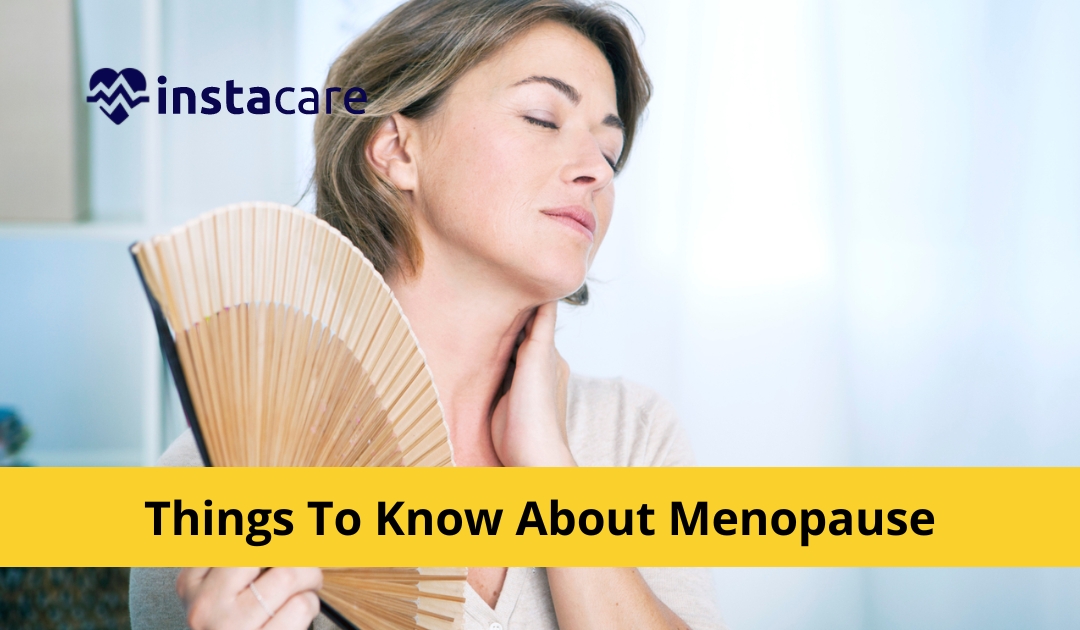Menopause, which signals the end of a woman's reproductive years, happens naturally. It occurs when the ovaries stop producing estrogen and progesterone, the hormones that regulate the menstrual cycle. Menopause usually happens between 45 and 55, but it can vary from person to person. Here are some essential things to know about menopause and how to cope with its symptoms.
What are the various signs and symptoms of menopause?
The most common sign of menopause is the absence of periods
for 12 consecutive months. However, some women may experience irregular
periods, spotting, or bleeding before menopause. This is called perimenopause
and can last for several years.
Other symptoms of menopause may include:
- Hot flashes
Sudden feelings of heat spread over the face, neck, and
chest, often accompanied by sweating and flushing.
- Night sweats
Hot flashes occur at night and disrupt sleep quality.
- Vaginal dryness
Reduced lubrication and elasticity of the vaginal tissues
can cause discomfort, itching, burning, and pain during sexual intercourse.
- Mood changes
Increased irritability, anxiety, depression, or mood swings
due to hormonal fluctuations and life stressors.
- Sleep problems
Difficulty falling asleep or also staying asleep, insomnia,
or restless sleep.
- Memory and concentration problems
Difficulty remembering things, focusing, or learning new
information.
- Weight gain
Increased fat accumulation around the abdomen, hips, and
thighs due to changes in metabolism and appetite.
- Reduced bone density
Loss of bone mass and also strength due to lower estrogen
levels can increase the risk of osteoporosis and fractures.
- Reduced muscle mass and strength
Loss of muscle tissue and tone due to lower estrogen levels
and physical inactivity.
- Changes in hair and skin
Thinning or losing hair on the scalp, face, or body; dryness, wrinkling, or skin sagging; increased facial hair growth.
View More: Everything To Know About Sanitary Pads
Menopause symptoms can vary in severity and duration from woman to woman. Some may experience mild or no symptoms, while others may have severe or bothersome symptoms that affect their quality of life. There are several ways to manage menopause symptoms, depending on your personal preferences and medical history. Some of them are:
Hormone therapy
The use of synthetic or natural hormones to replace the ones that are no longer produced by the ovaries. Hormone therapy can help relieve hot flashes, night sweats, vaginal dryness, mood changes, and bone loss. However, hormone therapy also has some risks and side effects, such as indeed an increased risk of breast cancer, stroke, blood clots, heart disease, and dementia. Therefore, hormone therapy should be used at the lowest effective dose and also for the shortest possible time under the guidance of a doctor.
View More: How to Quickly Get Rid of Razor Bumps on the Vagina
Non-hormonal medications
The use of prescription or over-the-counter drugs to treat specific symptoms of menopause. For example, antidepressants can help with mood changes; blood pressure medications can help with hot flashes; vaginal moisturizers or lubricants can help with vaginal dryness; bisphosphonates can help with bone loss, etc. However, non-hormonal medications also have risks and side effects that should be discussed with a doctor before use.
Lifestyle changes
The adoption of healthy habits that can improve your overall
well-being and reduce menopause symptoms. For example:
- Eating a balanced diet rich in fruits, amazing vegetables
and also whole grains, lean proteins, healthy fats, calcium, vitamin d, and phytoestrogens
(plant compounds that mimic estrogen).
- Avoid foods and drinks that may trigger hot flashes or
irritate the bladder or vagina, such as spicy foods, caffeine, alcohol, carbonated
drinks, citrus fruits, etc.
- Drinking plenty of water to also stay hydrated and prevent
dryness of the skin and mucous membranes.
- Exercising regularly to maintain a healthy weight,
strengthen your bones and muscles, improve your mood and sleep quality, and
reduce your risk of chronic diseases.
- Quitting smoking reduces your risk of heart disease, stroke,
lung cancer, osteoporosis, etc.
- Managing stress through relaxation techniques, meditation,
yoga, breathing exercises, etc.
- Seeking social support from your family, friends, partner,
or other women who are going through menopause.
Conclusion
An inevitable stage of a woman's life cycle is menopause—your levels of estrogen and progesterone drop throughout this period. Your risk for some diseases, such as osteoporosis or cardiovascular disease, may rise after menopause. Maintain a nutritious diet and get lots of exercise to handle your symptoms and prevent unneeded weight gain. If you suffer uncomfortable symptoms, you should call your doctor.
Source: https://instacare.pk/blog/things-to-know-about-menopause


